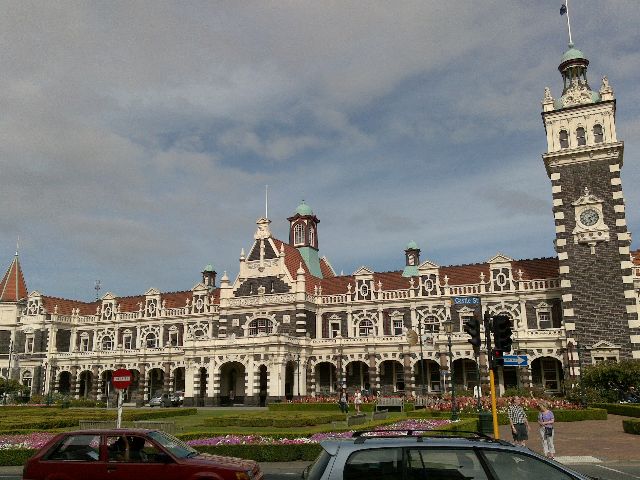|
The
Dunedin Railway Station
is one of the most iconic and historic buildings in
Dunedin, located in
the Otago region of
New Zealand's South Island.
Known for its stunning architecture and rich history, it is not only
a working station but also a popular tourist attraction, drawing
visitors for both its beauty and its historical significance.
Key Features of the
Dunedin Railway Station:
1.
Architectural Beauty
- The
Dunedin Railway Station
is a fine example of
Edwardian Baroque architecture and was designed by the
architectural firm Hunt
& Macdonald. The station opened in
1906 and was
built with a distinctive style, including
high vaulted ceilings,
intricate stained glass
windows, and
ornate stone carvings.
- The exterior of the station
features aesthetic
stonework, a
large clock tower, and a beautiful
central dome,
giving it a majestic and grand appearance. The building's
detailed façade and its well-preserved state make it one of the
most photographed buildings in New Zealand.
- The station’s
landscape gardens
with manicured lawns and trees further enhance its beauty,
creating a scenic setting that attracts both locals and
visitors.
2.
Historical Significance
- The
Dunedin Railway
Station was originally constructed to serve as the
heart of New Zealand’s
railway network in the early 20th century, designed to
accommodate the growing importance of rail transport in
connecting Dunedin to the rest of the country.
- It has been a focal point
for the city’s commercial and transportation development,
playing a crucial role in linking Dunedin with other regions in
the South Island, particularly for the
South Island Main
Trunk Line.
- The station’s
historical relevance
is not just tied to its construction but also to its ongoing
use, serving as a reminder of the vital role that railways
played in New Zealand’s history during the era of the early
1900s.
3.
Current Use
- While the
Dunedin Railway
Station no longer serves as a primary hub for daily
passenger train services (the railway station's role has reduced
significantly over the years with modern transport), it still
functions as a tourist
attraction and a point of departure for some scenic and
heritage train journeys, including the famous
Taieri Gorge Railway.
- The
Taieri Gorge Railway
offers passengers the opportunity to take a scenic train journey
through some of the South Island's most picturesque and rugged
landscapes, departing from Dunedin Railway Station.
4.
Visitor Attractions
-
Railway Museum:
Inside the station, visitors will find a
railway museum
that showcases historical exhibits related to New Zealand's
railway history. This includes models of old trains,
memorabilia, and photographs that tell the story of Dunedin’s
past.
-
Stunning Interiors:
The interior of the station is equally impressive, with its high
ceilings, intricate woodwork, and stained-glass windows. It's a
wonderful place to explore, capturing the grandeur and style of
the early 20th century.
-
Guided Tours:
For those interested in learning more about the history and
architecture of the station,
guided tours
are available to provide a deeper insight into the building’s
design, history, and significance.
-
Events and Functions:
The station also hosts occasional
events, such
as art exhibitions and concerts, and its grand hall is sometimes
used for private
events and
weddings, offering a beautiful backdrop for any
occasion.
5.
Nearby Attractions
-
Octagon: The
station is located near
The Octagon,
the central square in Dunedin, which is a hub of activity with
cafes, restaurants, and shops. It’s a great area to explore
after visiting the station.
-
Dunedin Botanic Garden:
Located a short drive away,
Dunedin Botanic Garden
is a peaceful spot with beautiful flower displays and gardens,
perfect for those wanting to spend some time outdoors.
-
Otago Peninsula:
Dunedin is also a gateway to the
Otago Peninsula,
famous for its wildlife, including
albatross,
seals, and
penguins.
It’s a great place for those wanting to experience New Zealand’s
natural beauty.
6.
Transport and
Accessibility
-
Located in Dunedin's
CBD: The Dunedin Railway Station is centrally located,
making it easily accessible from many of the city’s major
attractions and accommodations. The station itself is well
connected by local transport options, including buses and taxis.
-
Parking:
There is public
parking available around the station, making it easy
for visitors to park and explore the building and nearby
attractions.
Conclusion:
The Dunedin Railway
Station is a must-visit landmark in Dunedin, New Zealand,
known for its stunning
architecture,
rich history, and continued role in the city’s tourism
industry. Whether you're an architecture enthusiast, a railway
history buff, or a traveler seeking scenic train rides, the station
offers an unforgettable experience. It stands as a testament to
Dunedin’s past and remains one of New Zealand’s most beautiful and
well-preserved historic buildings.
|
Der Bahnhof von Dunedin, auch bekannt als Dunedin
Railway Station, ist eines der bekanntesten und
architektonisch beeindruckendsten Gebäude Neuseelands. Er liegt in
der Stadt Dunedin auf der Südinsel und ist ein bedeutendes
historisches und kulturelles Wahrzeichen.
Geschichte und Architektur:
-
Baujahr: Der Bahnhof wurde zwischen 1903 und
1906 erbaut und ist ein hervorragendes Beispiel für die edwardianische
Architektur im neobarocken Stil.
-
Architekt: Entworfen wurde das Gebäude von George
Troup, der auch als "Gingerbread George" bekannt war,
aufgrund der aufwendigen Verzierungen am Bahnhof.
-
Materialien: Der Bahnhof ist aus dunklem Basalt
und hellem Oamaru-Stein gebaut, was ihm ein charakteristisches
Aussehen verleiht.
Besonderheiten:
-
Fassade: Die Fassade ist reich verziert mit
Ornamenten, Säulen und kunstvollen Steinmetzarbeiten.
-
Mosaikboden: Im Inneren des Bahnhofs befindet
sich ein berühmter Mosaikboden aus
über 750.000 Fliesen, die ein kunstvolles Muster bilden.
-
Glasfenster: Die großen Buntglasfenster sind
ein weiteres Highlight und fügen dem Gebäude eine besondere
Atmosphäre hinzu.
-
Uhrturm: Der markante Uhrturm ist ein weithin
sichtbares Merkmal des Bahnhofs.
Heutige Nutzung:
-
Touristische Attraktion: Der Bahnhof ist ein
beliebtes Fotomotiv und ein Muss für Besucher von Dunedin.
-
Eisenbahnbetrieb: Obwohl der Bahnhof nicht mehr
der Hauptverkehrsknotenpunkt ist, verkehren von hier aus noch
einige touristische Züge, wie der Taieri
Gorge Railway, eine malerische Zugfahrt durch die
Schluchten und Landschaften der Region.
-
Veranstaltungen: Der Bahnhof wird auch für
Märkte, Ausstellungen und andere Veranstaltungen genutzt. Jeden
Samstag findet hier der Dunedin Farmers'
Market statt, bei dem lokale Produkte
angeboten werden.
Lage:
Der Bahnhof liegt zentral in Dunedin, nur wenige Gehminuten von der
Innenstadt entfernt. Die Adresse lautet:
Dunedin Railway
Station, Anzac Avenue, Dunedin, Neuseeland.
Besucherinformation:
-
Der Bahnhof ist für die Öffentlichkeit zugänglich, und der
Eintritt ist kostenlos.
-
Es gibt geführte Touren, die mehr über die Geschichte und
Architektur des Gebäudes vermitteln.
Der Dunedin Railway Station ist nicht nur ein funktionales Gebäude,
sondern auch ein Symbol für das reiche kulturelle Erbe der Stadt und
ein Muss für jeden Besucher der Region.
|
 Safaris
Bergsteigen
Wandern
Inselwandern Weltweit
Safaris
Bergsteigen
Wandern
Inselwandern Weltweit
 Europa
Inselwandern
Europa
Inselwandern
 Städtewandern
Städtewandern
 Paintings
Paintings Dirk Rauschenbach
Dirk Rauschenbach
 Safaris
Bergsteigen
Wandern
Inselwandern Weltweit
Safaris
Bergsteigen
Wandern
Inselwandern Weltweit
 Europa
Inselwandern
Europa
Inselwandern
 Städtewandern
Städtewandern
 Paintings
Paintings Dirk Rauschenbach
Dirk Rauschenbach

![]() 26.07.25 Copyright Dirk
Rauschenbach Koelnerstrasse 293 51702 Bergneustadt
Datenschutzerklaerung 02261 9788972 Mail ccooly(
at) web.de
26.07.25 Copyright Dirk
Rauschenbach Koelnerstrasse 293 51702 Bergneustadt
Datenschutzerklaerung 02261 9788972 Mail ccooly(
at) web.de